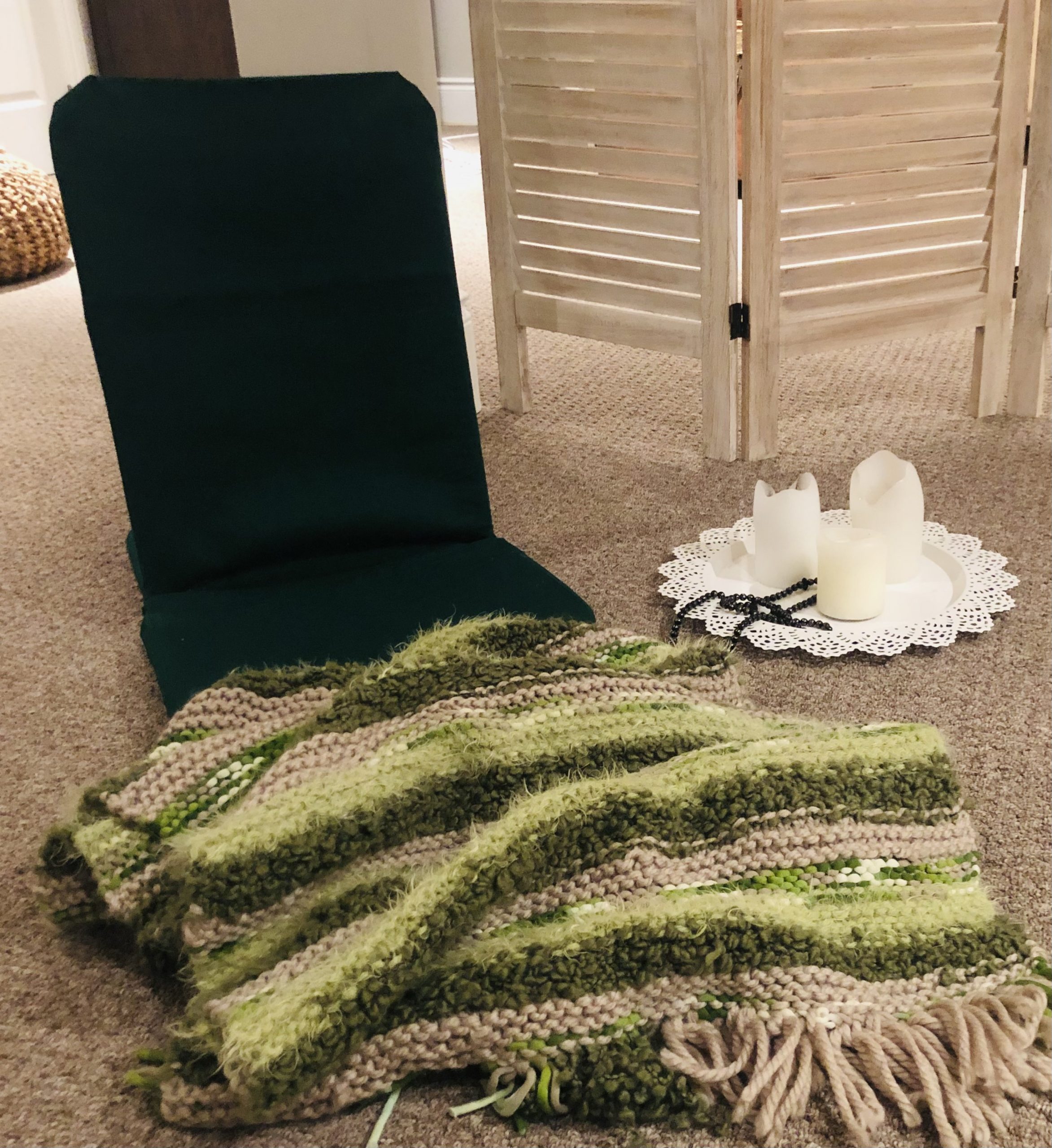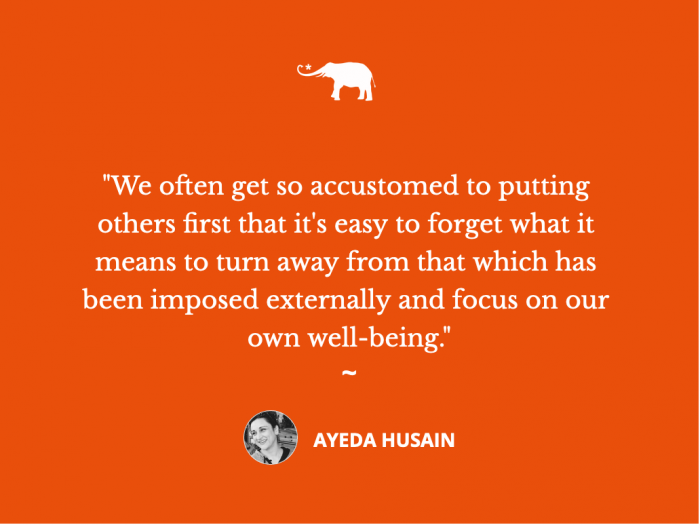I couldn’t go out, so I decided to go within.
Not half-heartedly, but full-plunge into a 10-day Sufi chilla. Chilla is a solitary meditative practice used by ancient Muslim mystics for healing, upliftment, and spiritual growth by disconnecting from the world for a period of time.
Let me explain: here in southern Ontario, we are now in our third lockdown with strict, legally enforceable stay-at-home orders while COVID-19 numbers continue to soar and vaccine supplies to be less than adequate.
“Languishing,” a state of mind described as a void between hope and despair, flourishing and depression, is now being cited as one of the many casualties of this current global pandemic.
It had started to feel too familiar.
Within the span of one year, I had seen my start-up go belly-up, had several non-Covid-related medical mishaps, and witnessed friends and loved ones completely overwhelmed by the virus as well as mental health issues.
I needed to avoid the black hole of collective despair all around me.
We are already living in isolation. Why ask for more?
It was challenging for some to understand that physical isolation did not mean disconnection—that our zealousness to remain connected (phones, social media, and Zoom) had led to fatigue and an overwhelming of the senses—and how the little square boxes we had been reduced to on our computer screens now represented the size of our auric fields.
So, is this the same as being quarantined?
Not quite. This is not an externally enforced mandate but a spiritual practice. It is done without any TV, electronics, or connection with anyone or anything. But perhaps, most importantly, it is a process that is undertaken with the guidance of a spiritual teacher who recommends spiritual practices that keep you balanced during the process.
But why?
The aim of a spiritual retreat is transformation. For this to happen, one has to disconnect and go to a place of quietude. This is where suppressed emotions and impressions come up.
In Sufism, we are taught to sit with them in a process that is the opposite of spiritual bypassing, using the Sufi tool of contemplation called Muḥāsaba. We trace our impulses back to their origin. And then we gently let them all go. A certain dissolution takes place. But when we return, we are refreshed and ready to reengage with life on a deeper level.
And so I did.
After 10 days of isolation in my basement, here is what I learned:
1. There is so much guilt!
I was surprised to see how guilty I felt taking these 10 days for myself. Vacations almost always ended up being about others, tangled up in outside energies. This was truly the first time in my life I had spent 10 whole days that were not about anyone else.
We often get so accustomed to putting others first that it’s easy to forget what it means to turn away from that which has been imposed externally and focus on our own well-being.
2. The world goes on without you.
It is a very human and inflated sense of importance that makes us feel like Atlas Shrugged carrying the world on our shoulders. The truth couldn’t be further. By taking a step back, we allow others a chance to grow, to come into their own. Micromanaging is not necessary. Someone else will step up; those meetings will take place without you. Your peace and your growth do not come at anyone else’s expense.
3. It is always a good time for an energetic reset.
In the middle of a pandemic? At this stage of your life? Really?
Yes! Actually, especially! It is never too late to redefine the narrative, to pick up the pieces of what seems desolate and build that which is beautiful. It is rarely in times of joy and sunshine that one needs to do the work of an alchemist, so do not let anyone dictate to you about the wrong or right time to do this.
4. Not picking up your phone first thing in the morning is the best thing you can do for yourself.
By not attending to our phones before we attend to ourselves, we take away the power of the outer world to set the tone for the rest of our day. When we are bombarded with news of gloom and doom and a formidable list of tasks before us before we even get out of bed, we spend the rest of the day in defensive and reactive mode.
Yes, in our daily lives, our phones are not something that can be ignored. But if we can set up a ritual of taking a few moments to ground ourselves before picking up that phone, we will see the benefits all day.
5. Shaking up your routine is good.
The cycles of your days do not have to be mandated by society. Doing things differently, breaking our mechanical, habitual patterns brings a fresh perspective, new energy, and heightened awareness of the mundane. It is like an eyewash that suddenly allows you to see in technicolor after having been limited to black and white.
There is great wisdom in mystics of different traditions recommending variations in one’s routine—it gets rid of stagnation. By taking on a different rhythm for a certain amount of time, one is able to shake out the calcified dross of unconscious, routine perception and begin to see anew.
6. Stop looking to the outside world to make you happy.
When you can generate your own feelings of wellness without waiting for that one thing to happen (a phone call, better news on TV), you realize what a codependent relationship you have had your whole life with the unpredictable—the external.
Of course, this does not happen on the first day. In fact, if you are not used to being alone, the process can feel quite apocalyptic—like the world is ending and you are the only one who exists. But if you sit with your feelings long enough (like the great Sufi, Ibn Arabi, said: to be “alone with the Alone”) and trace them back to their origin, you will find a wellspring of joy within you that exists regardless of outer circumstances.
7. Surrender.
So yes, there is a struggle with your suppressed thoughts and emotions; difficult memories and impressions come up in stillness. Perhaps even a feeling that one is being left out or left behind, that the world will go on without you. And then something pops, a sense of relief emerges, as you realize how fruitless your struggling is. So you release the impressions. You accept your lot. And, in doing so, you learn to surrender.
8. The effect different people/sounds/environments have on your energy.
After 10 days of sitting with yourself in silence, you become aware of energies in your environment—how a text from one person can send your energy plummeting downward while the thought of another makes your heart smile.
You are able to gauge the effect of a certain sound on the TV or energetic dips and peaks in different social settings you were not conscious of before. And when you do, you have the power to decide which influences you choose to allow into your life—limit or filter out and become aware of that which may still need healing.
9. The value of silence.
Ten days of silence teaches you to appreciate the richness of stillness and tranquility. Even when you emerge from your katabasis, you start seeking silence, not just from noise but from all that lowers your vibration. You have learned that silence is more than a mere lack of sound and now seek to silence all that is inharmonious—sounds, yes, but also thoughts, patterns, and interactions that cause disharmony.
10. Gratitude.
As we return to our lives, infused with a fresh perspective, we have come full circle—from transcendence to immanence, or, as the Sufis say, from “Fana to Baqa.” Having experienced the sublime, we now weave it into our lives, grateful for every conversation and every interaction we are able to have, grateful for every small thing knowing that it is gratitude for what we do have that opens up the doors of abundance and well-being, no matter what the outer circumstances.



 Share on bsky
Share on bsky





Read 11 comments and reply